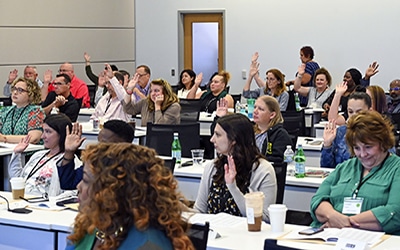As a testament of the organization’s evolving commitment to equity, diversity, and inclusion, Lutheran Social Services of Illinois (LSSI) released its Anti‑Racism Statement. The statement reflects LSSI’s commitment to equity, diversity, and inclusion, and is rooted in LSSI’s vision to serve the Whole Person. As part of that vision, LSSI employees strive to listen with empathy and compassion, promote the dignity of the person, value the diversity of human life, and help people realize their full potential.
A Whole‑Person view requires hearing and understanding the pain of disparity, inequity, and racism. “If we truly desire to promote the dignity of all people and value the diversity of human life, it is our charge to help by building community in ways that strengthen the ecosystem that surrounds us,” said LSSI President and CEO Mark Stutrud.
Here is the full Anti-Racism Statement:
“I learned that racism, like most systems of oppression, isn’t about bad people doing terrible things to people who are different from them but instead is a way of maintaining power for certain groups at the expense of others.” ― Alicia Garza, The Purpose of Power: How We Come Together When We Fall Apart
The COVID-19 pandemic presented unique conditions that enabled the world to collectively watch George Floyd take his final breath. There had been incidences of race-based violence in communities of color before and continue to be after. For LSSI, George Floyd is the impetus of our equity, diversity, and inclusion journey. People around the globe felt the spark that ignited fires which demanded change. This moment was another manifestation of centuries of white supremacy. However, the global pandemic forced us to stay inside and to pay attention in ways we had not previously. Amidst this, LSSI, known for serving people of diverse backgrounds, was faced with a choice: remain passive or work toward an equitable future.
Lutheran Social Services of Illinois has the goal of healing local communities. With a workforce of over 1,100 employees, LSSI impacts approximately 42,000 clients across the state annually. Our presence in the world does not exist in a vacuum. Our mission—our work—at LSSI responds to the Gospel to bring healing, justice, and wholeness to people and communities. Wholeness requires that each of us hears and understands the pain of disparity, inequity, and racism. We believe that LSSI, as an organization, and each of its employees individually, must commit not only to an Equity, Diversity, and Inclusion journey but to the work of actively being Anti-Racist.
At LSSI, we accept that our internal attitudes affect our external work, and that truly meaningful work cannot be done within our communities when it has not been done internally. We must recognize and reconcile with the realities of race and discrimination within our organization. We will begin to heal ourselves and our community by first acknowledging our own role in upholding systemic inequities; explicitly and implicitly.
“Racism is the process by which systems and policies, actions and attitudes create inequitable opportunities and outcomes for people based on race. Racism is more than just prejudice in thought or action. It occurs when this prejudice-whether individual or institutional-is accompanied by the power to discriminate against, oppress or limit the rights of others.” What is Racism? | Australian Human Rights Commission Racism is prejudice coupled with power.
“It is important to distinguish implicit racial bias from racism. Implicit racial bias can cause individuals to unknowingly act in discriminatory ways. This does not mean that the individual is overtly racist, but rather that their perceptions have been shaped by experiences and these perceptions potentially result in biased thoughts or actions.” Anti-racism is important because it requires us to be intentional and conscious of our actions. It is the ethical imperative of LSSI to be active in the practice of identifying, challenging, and changing behaviors and policies, organizationally, that perpetuate systemic racism. The opposite of racist is not non-racist, but anti-racist. https://aclrc.com/antiracism
We are accountable to our staff as well as the communities we engage. Thus, as we work to strengthen our internal culture and the connection to those we serve, LSSI commits to:
- Training all LSSI leadership in Anti-Racism. It is essential for all leadership to understand their current role in upholding systemic racism and inequitable systems for efforts to be made at dismantling these systems.
- Lifting the voices and experiences of impacted staff and clients. Centering these voices in LSSI’s structure and decision making will advance equitable opportunity and begin to dismantle systems of white supremacy and racism.
- Governance reflecting the diversity of staff at‑large and the communities being served.
- Advancing programs, policies, procedures, and legislative efforts that are specifically reviewed for their ability to decrease racial disparities and oppression. This has implications for all LSSI departments including Human Resources, Advancement, Finance, and Quality/Compliance.
- Providing all staff with learning and growth opportunities through the implementation of the Equity, Diversity, and Inclusion strategic plan with the goal of encouraging all staff to commit to a personal EDI and Anti-Racism journey.
- Identifying and lifting leaders at LSSI who are willing to champion our EDI and Anti-Racism efforts. LSSI acknowledges and honors that EDI & Anti-Racism leaders will emerge at all levels of the organization regardless of title or credential.
- Remaining open and transparent in this journey, communicating with staff and our community about our progress, outcomes, and ongoing challenges.
Radical change takes time; however, we are responding to the urgency of these issues as they affect our daily life and wellness. We will hold ourselves accountable by centering these efforts in our conversations, interactions, and decisions. We will not be bound by comfort, the status quo, history, or habit, and we will challenge ourselves to begin thinking and acting in a new way. This statement is a commencement, speaking aloud our commitment.
